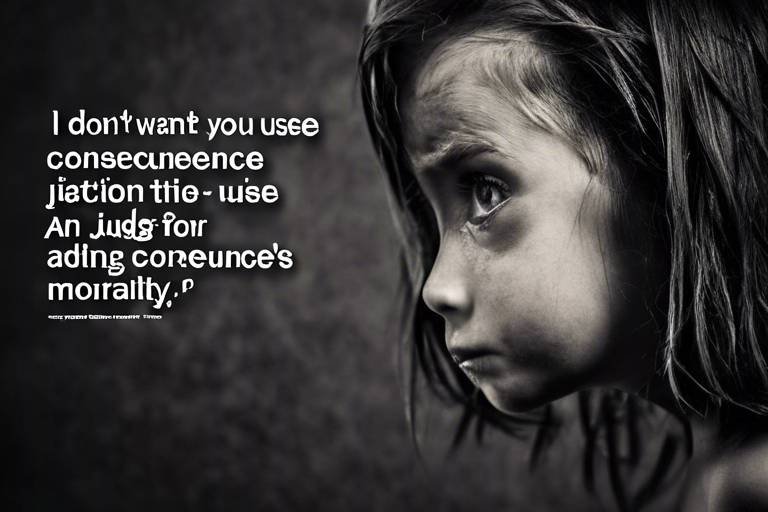What's the Role of Ethics in Marketing?
In today's fast-paced and competitive business environment, the role of ethics in marketing cannot be overstated. As consumers become more savvy and informed, they increasingly seek brands that align with their values. This shift has made ethical marketing not just a buzzword but a necessity for businesses aiming for long-term success. But what exactly does it mean to be ethical in marketing? It encompasses a range of practices that prioritize honesty, transparency, and responsibility, ensuring that the interests of consumers are not just acknowledged but actively protected.
When a company adopts ethical marketing practices, it sends a clear message to its audience: "We care about you." This approach fosters a sense of trust and loyalty among consumers, which is crucial in today's market where choices are abundant and competition is fierce. Imagine walking into a store where every product is clearly labeled, and the staff is genuinely interested in helping you find what you need. That feeling of being valued and respected is what ethical marketing aims to replicate on a larger scale.
Moreover, ethical marketing can significantly enhance a brand's reputation. In an era where information spreads like wildfire, a single unethical decision can lead to a public relations nightmare. On the flip side, companies that prioritize ethical practices often enjoy positive word-of-mouth referrals and a loyal customer base that champions their values. This not only translates to repeat business but also positions the brand favorably in the eyes of potential customers.
However, the journey towards ethical marketing is not without its challenges. Businesses must navigate a complex landscape of regulations and consumer expectations while also balancing profitability with ethical standards. This requires a commitment to ongoing education and training for marketing professionals, ensuring they are equipped with the necessary tools and knowledge to make ethical decisions.
In summary, the role of ethics in marketing is pivotal. It shapes consumer perceptions, builds trust, and ultimately contributes to a brand's long-term success. As we delve deeper into the various aspects of ethical marketing, we'll uncover best practices, real-world examples, and the potential pitfalls that come with misleading advertising. Stay tuned as we explore how transparency and integrity can redefine the marketing landscape.
- What is ethical marketing? Ethical marketing refers to the practice of promoting products and services in a manner that is honest, transparent, and respects consumer rights.
- Why is ethics important in marketing? Ethics is crucial in marketing as it builds consumer trust, enhances brand reputation, and fosters customer loyalty, all of which contribute to long-term success.
- What are some challenges in implementing ethical marketing? Common challenges include balancing profitability with ethical standards, navigating regulatory frameworks, and ensuring that all marketing professionals are trained in ethical practices.

The Importance of Ethical Marketing
In today's fast-paced world, where consumers are bombarded with countless advertisements and marketing messages, the significance of ethical marketing cannot be overstated. It serves as the foundation for building long-lasting relationships between brands and consumers. Imagine walking into a store where every product is labeled honestly, and the staff genuinely cares about your needs. This scenario reflects the essence of ethical marketing, where transparency and integrity reign supreme. When businesses adopt ethical practices, they not only enhance their brand image but also foster a sense of trust among their customers.
Moreover, ethical marketing is not just a buzzword; it's a strategic advantage that can lead to sustainable growth. Companies that prioritize ethics often find themselves reaping the rewards in the form of loyal customers who appreciate their honesty and commitment to social responsibility. This loyalty translates into repeat business and positive word-of-mouth referrals, which are invaluable in a competitive marketplace. In fact, studies have shown that consumers are willing to pay a premium for products from brands they trust, highlighting the direct correlation between ethics and profitability.
However, the journey to ethical marketing is not without its challenges. Many businesses grapple with the dilemma of balancing profitability with ethical practices. It’s like walking a tightrope; one misstep can lead to a fall. That's why establishing a clear set of ethical guidelines is essential. These guidelines should outline the core values of the organization and serve as a compass for decision-making. For instance, companies can adopt the following principles:
- Honesty: Always provide accurate information about products and services.
- Transparency: Be open about business practices and decision-making processes.
- Fairness: Treat all customers and stakeholders with respect and equity.
By adhering to these principles, businesses can create an environment where ethical marketing thrives. Furthermore, ethical marketing practices often lead to positive brand perception. Consumers today are more informed and socially conscious than ever before. They actively seek brands that align with their values and are willing to support those that demonstrate a commitment to ethical practices. This shift in consumer behavior emphasizes the need for businesses to not only market their products but to also market their values.
In conclusion, the importance of ethical marketing cannot be ignored. It builds trust, enhances brand loyalty, and contributes to long-term success. As businesses navigate the complexities of the modern marketplace, embracing ethical marketing practices will not only set them apart from competitors but also pave the way for a more sustainable and responsible business model.

Consumer Trust and Brand Loyalty
When it comes to marketing, trust isn’t just a buzzword; it’s the lifeblood of any successful business. Imagine walking into a store where the employees are friendly, the products are high-quality, and the prices are fair. You’d likely feel comfortable making a purchase, right? That’s the power of consumer trust. It’s the invisible thread that binds customers to brands, creating a relationship that extends beyond mere transactions. In today’s competitive landscape, where options are abundant, brands that prioritize ethical practices are the ones that stand out and cultivate lasting loyalty.
So, what exactly does ethical behavior look like in marketing? It’s about more than just avoiding false claims; it’s a commitment to transparency, honesty, and respect for consumers. When brands are open about their practices—whether it’s how they source materials or how they treat their employees—they foster a sense of authenticity. This authenticity resonates with consumers, leading them to choose one brand over another, even if it means paying a little more. After all, who wouldn’t want to support a company that aligns with their values?
Moreover, the ripple effect of trust extends to brand loyalty. When consumers feel valued and respected, they are more likely to return for future purchases. This loyalty isn’t just about repeat business; it’s about consumers becoming brand advocates. They share their experiences with friends and family, post positive reviews online, and even defend the brand in the face of criticism. In a world where word-of-mouth can make or break a business, this kind of organic promotion is invaluable.
To illustrate the impact of trust on brand loyalty, consider the following table that outlines key factors contributing to consumer trust:
| Factor | Description |
|---|---|
| Transparency | Open communication about products, services, and company practices. |
| Consistency | Delivering reliable products and services consistently over time. |
| Customer Engagement | Actively involving customers in the brand experience and valuing their feedback. |
| Ethical Practices | Adhering to fair practices in sourcing, production, and marketing. |
In essence, the relationship between consumer trust and brand loyalty is symbiotic. Brands that invest in ethical marketing not only attract customers but also retain them. This leads to a sustainable business model where profits are not just a number, but a reflection of a brand that cares. Ethical marketing practices create a community of loyal customers who feel good about their choices. They’re not just buying a product; they’re buying into a vision, a mission, and a set of values that resonate with their own.
As we navigate this ever-changing market landscape, it’s clear that the brands that prioritize ethics will be the ones that thrive. They’ll be the ones who not only capture consumer attention but also maintain it through trust and loyalty. And in the end, isn’t that what every business strives for? A loyal customer base that believes in their brand?
- What is the most important factor in building consumer trust? Transparency is key; consumers appreciate honesty and clear communication.
- How can a brand improve its ethical practices? By regularly reviewing its marketing strategies and ensuring they align with ethical standards.
- Can unethical marketing practices be reversed? Yes, but it requires a genuine commitment to change and rebuilding trust with consumers.

Transparency in Advertising
In the fast-paced world of marketing, where every second counts and every message matters, stands out as a beacon of trust. Imagine you're shopping online, and you come across two brands offering similar products. One brand provides detailed information about their product's ingredients, sourcing, and even their manufacturing processes, while the other keeps things vague and shrouded in mystery. Which one would you trust more? The answer is clear: consumers gravitate towards brands that are open and honest about what they offer. Transparency isn’t just a buzzword; it’s a vital component of ethical marketing that can significantly impact consumer relationships and brand loyalty.
When brands choose to be transparent, they create a foundation of trust that resonates with consumers. This trust is not built overnight; it requires consistent efforts and a commitment to honesty. For instance, when a company openly shares its pricing strategies, production methods, and even the challenges it faces, it cultivates a sense of reliability. Consumers appreciate brands that are willing to pull back the curtain and show them what goes on behind the scenes. This openness can lead to a more profound emotional connection, encouraging consumers to choose that brand time and again.
Moreover, transparency in advertising has become increasingly important in the age of social media. With the power of platforms like Instagram and Twitter, consumers can easily share their experiences—both positive and negative. A single misleading advertisement can lead to a social media firestorm, potentially damaging a brand's reputation almost instantly. Therefore, brands must be proactive in ensuring their advertising messages are clear, accurate, and not misleading. This means avoiding exaggerated claims and providing all necessary information upfront, allowing consumers to make informed choices.
The benefits of transparency extend beyond just consumer trust. Brands that are transparent often enjoy enhanced brand loyalty and a positive public image. When customers feel they are being treated fairly and honestly, they are more likely to become advocates for the brand, sharing their positive experiences with friends and family. This word-of-mouth marketing is invaluable and can significantly boost a brand's reach and reputation.
To illustrate the importance of transparency in advertising, consider the following table that compares two fictional brands, Brand A and Brand B, based on their advertising practices:
| Criteria | Brand A | Brand B |
|---|---|---|
| Product Information | Detailed and clear | Vague and unclear |
| Customer Reviews | Encourages feedback | Hides negative reviews |
| Price Transparency | Clear pricing with no hidden fees | Ambiguous pricing structure |
| Social Media Engagement | Active and responsive | Rarely engages with customers |
As seen in the table, Brand A’s transparent practices lead to a more favorable perception among consumers, while Brand B's lack of transparency can result in skepticism and distrust. This example highlights how transparency in advertising can be a game-changer for businesses looking to foster strong relationships with their customers.
In conclusion, transparency in advertising is not merely a strategy; it’s a commitment to ethical marketing that pays off in the long run. By being honest and open, brands can build lasting consumer trust, enhance loyalty, and ultimately drive sustainable growth. So, the next time you craft a marketing message, ask yourself: Are you being transparent enough? Remember, in a world full of choices, consumers will always choose the brands that offer them the most clarity.

Case Studies of Ethical Brands
When we think about ethical brands, a few shining examples come to mind that have not only prioritized ethics but have also seen their businesses flourish as a result. One such brand is Patagonia, a company that has made environmental responsibility its core mission. By pledging 1% of sales to the preservation and restoration of the natural environment, Patagonia has not only built a loyal customer base but has also positioned itself as a leader in sustainable practices. Their commitment to transparency is evident in their supply chain, where they openly share information about the sourcing of materials and the treatment of workers. This level of honesty has fostered a strong bond with consumers who value sustainability.
Another exemplary brand is Ben & Jerry's, known for its delicious ice cream and commitment to social justice. The company has taken bold stances on various issues, from climate change to racial equality. By aligning their products with their values, Ben & Jerry's has cultivated a community of passionate supporters who appreciate their efforts to make a difference. Their "Fairtrade" certifications on many of their ingredients not only ensure fair wages for farmers but also resonate with consumers who prioritize ethical consumption.
These brands demonstrate that ethical marketing is not just a trend but a viable long-term strategy. They have shown that when companies prioritize ethics, they can achieve remarkable growth while contributing positively to society. However, it's important to note that ethical marketing is not without its challenges. Brands must continuously assess their practices to ensure they are genuinely contributing to ethical standards rather than simply engaging in greenwashing.
To further illustrate the impact of ethical marketing, let's take a look at a table comparing these two brands based on key ethical practices:
| Brand | Core Ethical Focus | Key Initiatives | Consumer Impact |
|---|---|---|---|
| Patagonia | Environmental Sustainability | 1% for the Planet, supply chain transparency | Strong loyalty among eco-conscious consumers |
| Ben & Jerry's | Social Justice | Fairtrade ingredients, activism for social issues | Community of passionate supporters |
These case studies reveal that ethical marketing can lead to a powerful connection between brands and consumers. When businesses authentically commit to their values, they not only attract like-minded customers but also inspire trust and loyalty. As consumers become increasingly aware of the impact of their purchases, brands that prioritize ethics will likely stand out in a crowded marketplace. In a world where consumers are bombarded with choices, the ones that resonate with their values will ultimately prevail.
- What is ethical marketing? Ethical marketing refers to the practice of promoting products and services in a way that is honest, fair, and responsible, taking into consideration the welfare of consumers and society at large.
- Why is consumer trust important in marketing? Consumer trust is vital as it leads to brand loyalty, repeat business, and positive word-of-mouth, which can significantly enhance a brand's reputation and long-term success.
- How can a company implement ethical marketing practices? Companies can implement ethical marketing by ensuring transparency in advertising, prioritizing customer welfare, adhering to regulations, and engaging in socially responsible initiatives.
- What are the consequences of unethical marketing? Unethical marketing can lead to consumer backlash, loss of brand reputation, legal penalties, and ultimately, a decline in sales and market share.

Consequences of Misleading Advertising
Misleading advertising can have serious repercussions for brands and businesses. When companies choose to exaggerate claims or present false information, they may initially attract customers, but the long-term effects can be devastating. Imagine investing in a product that promises miraculous results, only to discover that it falls short of its claims. This experience not only leads to consumer disappointment but can also result in a profound loss of trust in the brand. Trust, once lost, is incredibly difficult to regain, and the negative word-of-mouth that follows can spread like wildfire.
Moreover, the legal implications of misleading advertising can be severe. Regulatory bodies, such as the Federal Trade Commission (FTC) in the United States, actively monitor advertising practices. When a company is found to be engaging in deceptive marketing, they may face hefty fines, legal battles, and a tarnished reputation. This not only affects the bottom line but can also deter potential customers who are wary of engaging with a brand known for unethical practices.
To illustrate the impact of misleading advertising, let's consider a few notable examples:
| Brand | Issue | Consequence |
|---|---|---|
| Volkswagen | Emissions scandal | Billions in fines, loss of consumer trust |
| Red Bull | Claims about energy boost | Settled a $13 million lawsuit |
| P&G | False claims about a product | Negative media coverage, loss of sales |
These cases serve as cautionary tales for marketers everywhere. They highlight the critical importance of maintaining honesty and integrity in advertising. Not only can misleading claims lead to financial penalties, but they can also result in a damaged reputation that takes years to rebuild. In today’s digital age, where information spreads rapidly via social media and online reviews, one misstep can lead to a significant backlash.
Furthermore, the consequences of misleading advertising extend beyond just the immediate financial impacts. They can also affect employee morale and stakeholder confidence. When employees work for a company that prioritizes ethical practices, they are more likely to feel proud of their work, leading to higher productivity and lower turnover rates. Conversely, if a company is embroiled in scandal due to misleading advertising, employees may feel disillusioned, which can lead to a toxic work environment.
In conclusion, the consequences of misleading advertising are far-reaching. From legal ramifications to loss of consumer trust and employee morale, the stakes are high. It’s crucial for businesses to commit to ethical marketing practices, ensuring that their advertising is not only compelling but also truthful. After all, in the world of marketing, honesty truly is the best policy.
- What are the legal consequences of misleading advertising?
Companies can face fines, lawsuits, and regulatory scrutiny if found guilty of deceptive practices. - How does misleading advertising affect consumer trust?
It can significantly damage trust, leading to negative perceptions and loss of repeat customers. - Can ethical marketing practices improve brand reputation?
Yes, ethical marketing fosters consumer loyalty and enhances overall brand image. - What steps can companies take to ensure ethical advertising?
Companies should focus on transparency, truthfulness, and compliance with advertising standards.

Regulatory Frameworks and Guidelines
When it comes to ethical marketing, understanding the is crucial for businesses aiming to maintain integrity and consumer trust. These regulations not only provide a structure for ethical practices but also help protect consumers from misleading and harmful marketing tactics. Governments and regulatory bodies around the world have established laws that dictate how companies should communicate with consumers, ensuring that their marketing strategies are transparent and honest.
In the United States, for example, the Federal Trade Commission (FTC) plays a pivotal role in overseeing marketing practices. The FTC enforces regulations that prohibit deceptive advertising and require clear disclosures in marketing communications. This means that marketers must be forthright about their products and services, avoiding any language that could mislead consumers. The guidelines set by the FTC emphasize the importance of truthfulness and clarity in advertising, which are foundational elements of ethical marketing.
Similarly, in the European Union, the General Data Protection Regulation (GDPR) has introduced strict rules regarding consumer data protection. This regulation not only affects how companies collect and use consumer data but also mandates transparency in how personal information is handled. Marketers must ensure that they are compliant with GDPR standards, which fosters a sense of trust and security among consumers regarding their personal information.
The following table summarizes key regulatory frameworks and their implications for ethical marketing:
| Regulatory Body | Key Regulations | Implications for Marketers |
|---|---|---|
| Federal Trade Commission (FTC) | Truth in Advertising | Must provide honest and clear information about products. |
| General Data Protection Regulation (GDPR) | Data Protection and Privacy | Requires transparency in data collection and usage. |
| Advertising Standards Authority (ASA) | Advertising Codes | Ensures ads are legal, decent, honest, and truthful. |
Additionally, many industries have their own specific guidelines that marketers must adhere to. For instance, the American Medical Association (AMA) has established ethical guidelines for marketing in the healthcare sector, ensuring that advertisements do not exploit vulnerable populations or misrepresent medical information. These industry-specific guidelines serve as a reminder that ethical marketing is not a one-size-fits-all approach; it requires a nuanced understanding of the sector in which one operates.
In conclusion, navigating the complex landscape of regulatory frameworks and guidelines is essential for any marketer committed to ethical practices. By staying informed and compliant with these regulations, businesses can not only avoid legal repercussions but also build a strong foundation of trust with their consumers. After all, in the world of marketing, where consumer perception can make or break a brand, maintaining ethical standards is not just a legal obligation—it's a pathway to long-term success.
- What is the role of the FTC in marketing?
The FTC regulates advertising practices to ensure they are truthful and not misleading. - How does GDPR affect marketing?
GDPR mandates transparency in data collection and usage, requiring companies to protect consumer privacy. - Are there specific guidelines for different industries?
Yes, many industries have their own ethical guidelines that marketers must follow.

Challenges in Implementing Ethical Marketing
Implementing ethical marketing practices is not as straightforward as it might seem. In a world driven by competition and profit margins, businesses often face a myriad of challenges that can complicate their efforts to maintain ethical standards. One significant challenge is the pressure to meet financial goals. Companies are frequently pushed to achieve higher sales and profit margins, which can lead to a temptation to cut corners or engage in misleading practices. This pressure can create a conflict between the desire for profitability and the commitment to ethical behavior.
Moreover, the lack of clear guidelines can make it difficult for marketers to know what constitutes ethical behavior. While there are regulatory frameworks in place, the nuances of ethical marketing can vary significantly across industries and regions. This ambiguity can lead to confusion and inconsistency in how businesses approach their marketing strategies. For example, what is deemed acceptable in one country may be considered unethical in another, making it crucial for companies to stay informed and adaptable.
Another notable challenge is the influence of digital marketing. The rise of social media and online advertising has transformed how brands communicate with consumers. While these platforms offer unprecedented opportunities for engagement, they also come with risks. The speed at which information spreads online means that any unethical behavior can quickly lead to public backlash. Companies must navigate this landscape carefully, ensuring that their marketing messages are not only compelling but also honest and transparent.
Additionally, there is often a disconnect between company values and consumer expectations. Many consumers today are more informed and socially conscious, demanding that brands take a stand on ethical issues. However, businesses may struggle to align their marketing strategies with these expectations, especially if their internal practices do not reflect the values they promote externally. This misalignment can lead to accusations of hypocrisy, damaging the brand's reputation and eroding consumer trust.
To address these challenges, companies need to adopt a proactive approach. This includes implementing ongoing training and education programs for marketing teams to foster a culture of ethics within the organization. By equipping marketers with the knowledge and tools to make ethical decisions, businesses can better navigate the complexities of the marketing landscape. Furthermore, companies should regularly assess their marketing strategies against ethical standards and consumer expectations, ensuring alignment and transparency in all communications.
In conclusion, while the challenges of implementing ethical marketing are significant, they are not insurmountable. By prioritizing ethics and transparency, businesses can build stronger relationships with consumers, enhance their brand reputation, and ultimately achieve sustainable success in the marketplace.
- What are the main challenges businesses face in ethical marketing? Businesses often struggle with financial pressures, lack of clear guidelines, digital marketing complexities, and aligning company values with consumer expectations.
- How can companies ensure they are practicing ethical marketing? Companies can implement training programs, regularly assess their marketing strategies, and prioritize transparency and honesty in all communications.
- Why is consumer trust important in marketing? Consumer trust is essential for brand loyalty and can lead to repeat business and positive word-of-mouth referrals, ultimately contributing to long-term success.

Balancing Profit and Ethics
In today's fast-paced business landscape, the challenge of is more critical than ever. Companies often find themselves at a crossroads where they must choose between maximizing profits and adhering to ethical standards. This dilemma can feel like walking a tightrope—one misstep could lead to a fall from grace, damaging not only the company's reputation but also its bottom line. So, how can businesses navigate this tricky terrain without compromising their values?
First and foremost, it’s essential to understand that ethics and profitability are not mutually exclusive; in fact, they can complement each other beautifully. When a company prioritizes ethical practices, it often leads to increased consumer trust and loyalty. Customers are more likely to support brands that align with their values, creating a loyal customer base that drives repeat business. Think of it this way: a strong ethical foundation acts as a magnet, attracting customers who appreciate transparency and integrity.
To successfully balance profit and ethics, companies can adopt several strategies. For instance, they can implement sustainable practices that not only reduce costs in the long run but also appeal to environmentally conscious consumers. By investing in eco-friendly materials or adopting energy-efficient processes, businesses can enhance their brand image while also boosting their profitability. This dual approach aligns the company’s operations with ethical standards and meets the growing demand for sustainability.
Moreover, fostering a culture of ethical decision-making within the organization is crucial. This means training employees to recognize ethical dilemmas and empowering them to make decisions that reflect the company’s values. A well-informed team can navigate challenges creatively, finding innovative solutions that satisfy both ethical considerations and financial goals. For example, a marketing team might choose to promote a product’s benefits honestly, even if it means sacrificing short-term sales, knowing that long-term trust will pay off.
However, it’s not always smooth sailing. Companies may face pressure from stakeholders to prioritize profits over ethics, especially in highly competitive markets. This pressure can lead to ethical compromises that ultimately backfire. A classic example is the fallout from companies that have engaged in misleading advertising. The short-term gains from such tactics can quickly evaporate, replaced by long-lasting damage to brand reputation and consumer trust. Thus, maintaining ethical standards is not just a moral obligation; it's a strategic necessity.
In conclusion, balancing profit and ethics is a delicate dance that requires commitment and creativity. Companies that embrace ethical practices not only enhance their reputation but also pave the way for sustainable growth. By aligning their business strategies with ethical values, organizations can create a win-win situation where both profits and principles thrive. As the market evolves, those who choose to prioritize ethics will likely find themselves ahead of the curve, reaping the rewards of a loyal customer base and a robust brand reputation.
- Why is ethical marketing important? Ethical marketing builds consumer trust and loyalty, which are essential for long-term success.
- How can companies implement ethical marketing practices? Companies can adopt transparent advertising, sustainable practices, and employee training programs to promote ethics in marketing.
- What are the consequences of unethical marketing? Misleading advertising and unethical practices can lead to consumer backlash and damage a brand's reputation.
- Can profit and ethics coexist? Yes, prioritizing ethical practices can enhance consumer trust, leading to increased loyalty and profitability.

Training and Education for Marketers
In the ever-evolving landscape of marketing, training and education for marketers are not just important; they are essential. Why? Because the world of marketing is constantly changing, influenced by technology, consumer behavior, and ethical standards. Without proper training, marketers might find themselves lost in a sea of outdated practices and ethical dilemmas. Imagine trying to navigate a ship without a compass—it's not just challenging; it's risky!
To equip marketers with the right tools, organizations must invest in comprehensive training programs that focus on ethical marketing practices. These programs should cover a range of topics, including consumer rights, transparency in advertising, and the impact of misleading information. By fostering an environment where ethical considerations are at the forefront, companies can cultivate a workforce that not only understands the importance of ethics but also embodies these values in their everyday work.
Moreover, training shouldn't be a one-time event. Just like any other skill, ethical decision-making requires ongoing education and reinforcement. Regular workshops, seminars, and online courses can help keep marketers up-to-date with the latest ethical guidelines and best practices. For instance, companies can create a curriculum that includes:
- Case studies of ethical dilemmas faced by brands
- Interactive sessions on how to handle ethical conflicts
- Guest speakers from successful ethical brands
By providing these resources, businesses not only enhance their employees' skills but also strengthen their overall brand reputation. A well-educated marketing team can make informed decisions that align with both the company's goals and ethical standards. This approach not only prevents potential pitfalls but also positions the brand as a leader in ethical marketing.
Furthermore, incorporating ethics into marketing education can lead to significant long-term benefits. For example, companies that prioritize ethical training often see a boost in consumer trust and loyalty. When customers know that a brand is committed to ethical practices, they are more likely to become repeat buyers and advocates for the brand. This creates a positive cycle where ethical marketing leads to increased sales, which in turn allows for further investment in ethical practices.
In conclusion, the importance of training and education for marketers cannot be overstated. It is a vital component that helps maintain ethical standards in a competitive market. By investing in their workforce and prioritizing ethical education, companies can ensure that their marketing strategies are not only effective but also responsible and trustworthy. After all, in a world where consumers are increasingly aware and concerned about ethical practices, having a well-informed marketing team is not just an advantage; it’s a necessity.
- Why is ethical training important for marketers?
Ethical training helps marketers make informed decisions that align with consumer rights and company values, fostering trust and loyalty. - What topics should be included in ethical marketing training?
Topics should cover transparency, consumer rights, case studies, and handling ethical dilemmas. - How can companies ensure their marketing teams stay updated on ethical practices?
Regular workshops, seminars, and online courses can help keep marketing teams informed about the latest ethical practices.
Frequently Asked Questions
- What is ethical marketing?
Ethical marketing refers to the practice of promoting products and services in a way that is honest, transparent, and respects consumer rights. It focuses on building trust and maintaining a positive brand image, rather than using manipulative tactics.
- Why is ethical marketing important?
Ethical marketing is crucial because it fosters consumer trust and loyalty. When businesses operate ethically, they create a positive perception that can lead to sustainable growth and long-term success. Consumers are more likely to support brands they trust.
- How does transparency in advertising affect consumer trust?
Transparency in advertising helps build consumer trust by ensuring that promotional messages are clear and honest. When consumers feel informed and not misled, they are more likely to develop a positive relationship with the brand.
- Can you provide examples of ethical brands?
Sure! Brands like Patagonia and Ben & Jerry's are known for their ethical marketing practices. They prioritize sustainability and social responsibility, which resonates with consumers and enhances their brand loyalty.
- What are the consequences of misleading advertising?
Misleading advertising can severely damage a brand's reputation. It can lead to consumer backlash, loss of trust, and even legal repercussions. Maintaining ethical standards is essential to avoid these negative outcomes.
- What regulatory frameworks govern ethical marketing?
Various regulatory frameworks exist to ensure ethical marketing practices, such as the Federal Trade Commission (FTC) guidelines in the U.S. These regulations protect consumer rights and promote fair advertising practices.
- What challenges do businesses face in implementing ethical marketing?
Businesses often struggle to balance profitability with ethical practices. Additionally, there may be a lack of awareness or training regarding ethical standards among marketing professionals, making it challenging to implement these practices effectively.
- How can companies balance profit and ethics?
Companies can balance profit and ethics by integrating ethical considerations into their business strategies. This might involve developing sustainable products, engaging in fair trade, and prioritizing customer satisfaction over short-term gains.
- Is training important for ethical marketing?
Absolutely! Training and education are essential for marketers to understand and commit to ethical practices. Providing training programs helps instill ethical values and decision-making skills that promote responsible marketing.



















